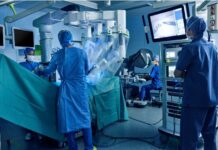By Dr Monil Parsana, Consultant Head and Neck Oncology Surgeon, HCG Hospital, Rajkot.
The seemingly minor player in the grand scheme of health, salivary gland is vital for comfortable functioning. When these glands malfunction or stop working altogether, a domino effect disrupts several aspects of our daily routine. From the simple pleasure of tasting food to the crucial function of swallowing, a dry mouth caused by non-functioning salivary glands can significantly impact our ability to eat, speak, and even sleep soundly.
Salivary glands in our mouth and throat produce saliva, which is essential for digestion and dental health.However, difficulty can occasionally arise inside these glands, leading to the development of salivary gland cancer. While uncommon, recognizing this illness can help with early discovery and treatment.
Types of Salivary Gland Cancer
Salivary gland tumors can be benign (noncancerous) or malignant (cancerous), however this cancer canencompassseveral types, depending on the specific cells involved. The primary types known to us include:
- Mucoepidermoid Carcinoma: This is the most common type of salivary gland cancer, and it is usually found in the parotid glands.
- Adenoid Cystic Carcinoma: It is known for its slow growth but has the potential to spread along nerve pathways during its progression in the body.
- Acinic Cell Carcinoma: This cancer develops in the cells that produce digestive enzymes within the saliva. It usually occurs in the parotid gland and has a variable prognosis depending on the grade and spread.
- Adenocarcinoma: This is a rare type of cancer that originates in the lining cells of the salivary glands.
Symptoms of Salivary Gland Cancer
Early detection in cases of salivary gland cancer is very crucial for a better success rate. Hence it is advised to be vigilant of these symptomsand if any of these occur, it is advised to visit your physician at the earliest.
- A lump or swelling: It is usually painless, and will be located near the jaw, neck, or mouth.
- Facial pain or numbness: This occurs partially on either side of the face,and this happens if the tumor presses on nerves.
- Difficulty swallowing: Due to obstruction or pressure from the tumor it becomes difficult to swallow foodalong with change in taste
- Persistent facial muscle weakness: Due to the cancer development, facial musclesbecome weak which indicates nerve involvement.
- Swelling or pain around the ear: This is linked to parotid gland involvement
It is crucial to realize that similar symptoms might also be caused by less serious illnesses. However, obtaining a timely diagnosis is critical for effective treatment.
Preventive Measures
There are no guaranteed ways to prevent salivary gland cancer, but certain practices can help reduce the risk of this cancer in our bodies. Excessive alcohol and tobacco consumption should be avoided. Wear protective equipment in hazardous areas to protect yourself against harmful substances. Regular dental checkups and maintaininggood oral hygiene can assist with detecting any abnormalities early on. In addition to the above, we should also eat a balanced diet and develop the practice of exercising on a regular basis.
Treatment of Salivary Gland Cancer
Treatment for salivary gland cancer depends on the type, stage, and location of the cancer, as well as the patient’s overall health. Common treatment options include:
- Surgery: It is the primary treatment for most salivary gland cancers, aiming to remove the tumor and some surrounding tissue.
- Radiation therapy: Often used after surgery to destroy any remaining cancer cells and reduce recurrence risk.
- Chemotherapy: This can be used for advanced or metastatic cancer, although it is less commonly effective for salivary gland cancers compared to other types.
- Targeted therapy: It involves drugs designed to target specific cancer cell mechanisms, potentially with fewer side effects.
Conclusion
Despite being rare, salivary gland cancer requiresone to be aware of their oral health. Early detection is key, so watch for symptoms and seek prompt medical attention. Fortunately, treatment options like surgery, radiation, and chemo are improving the prognosis. A healthy lifestyle and regular dental care contribute to overall oral health.























